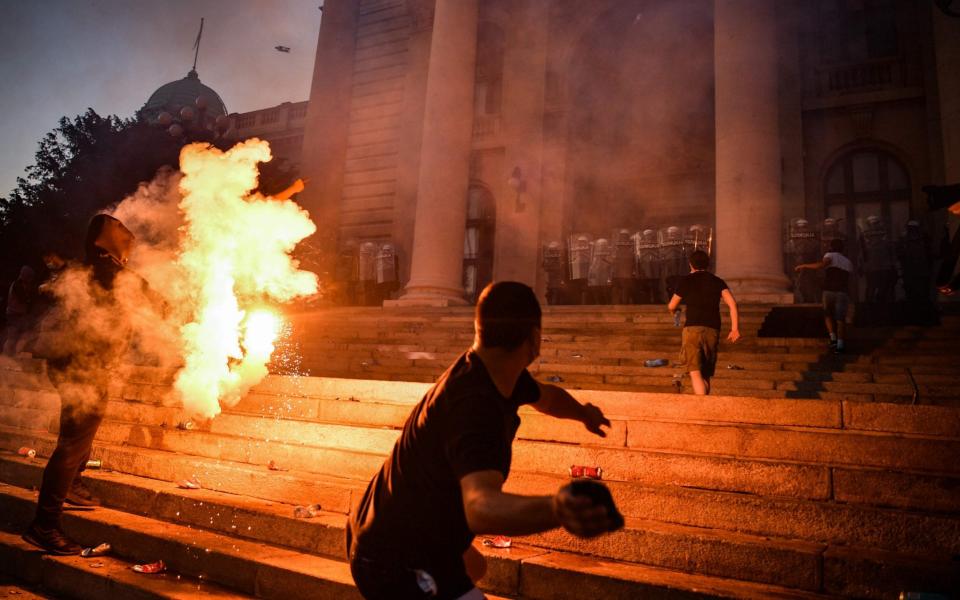Serbia bans gatherings of more than ten after Belgrade rocked by second night of violent protests

Serbia moved on Thursday to crack down on protests as it banned gatherings of more than 10 people in Belgrade after two nights of violent clashes between police and thousands of demonstrators.
Authoritarian president Aleksander Vucic abandoned plans for a tough lockdown in the capital to counter a renewed surge in coronavirus after the move sparked protests culminating in riots that left scores injured.
Police fired tear gas and threw stun grenades at protesters on Wednesday evening. Videos on social networks appeared to show officers severely beating up some demonstrators.
Demonstrations spread on Wednesday to Novi Sad and Nis, the second and third largest cities in the country.
While the protests were at first driven by anger over economically-stifling measures to contain the pandemic, they evolved quickly into anti-government rallies. Participants demanded Mr Vucic's resignation.
One piece of video footage from the capital on Wednesday showed a protester being hit and kicked by several police officers. He was dumped, apparently unconscious, on the pavement.
Belgrade residents said police tactics were much more heavy-handed than they had been previously. Amnesty International criticised ‘the disproportionate use of force’, and there were worries that the new limits on gatherings might exacerbate confrontations.
The U.S. Embassy was "deeply concerned". "We condemn all violence, including what appeared to us to be coordinated attacks on police seemingly intended to provoke overreactions as well as what appeared to be the use of excessive force by police," it said.
An opposition leader, Bosko Obradovic, slightly injured during protests, accused the police of “needless brutality”. He said Mr Vucic would “trample on anyone” to retain “absolute power.”

The watering-down of the lockdown measures came as Mr Vucic was on his way to a summit in Paris with French President Emmanuel Macron over the future of Kosovo. Some of the demonstrators were believed to be nationalists opposed to any deal with the fledgling country. Mr Vucic has also hinted at Russian involvement in the demonstrations.
Prime minister Ana Brnabic announced the restriction on gatherings was intended to prevent the virus’ further spread following the clashes, where social distancing was barely observed and only a minority wore masks. Businesses including cafes and shops will shut early.
The measures stop well short of the Friday night to Monday morning curfew that Mr Vucic had announced. She said: “The lockdown would have been the most efficient measure, but we decided to take this interim step instead."
Serbia, with a population of seven million, has so far reported 341 deaths. But the number of new infections rose to a record 357 on Wednesday from 299 on Tuesday. Health authorities say hospitals are running at full capacity and staff are exhausted.
Critics say government decisions to allow football matches, religious festivities, parties and private gatherings to resume in May are to blame for the new surge in infections. They say Mr Vucic was desperate to push ahead with parliamentary elections on June 21 to cement his hold on power before the full economic cost of the crisis began to kick in.

